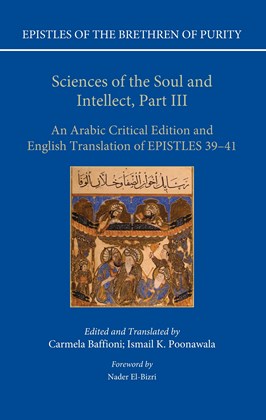Sciences of the Soul and Intellect, Part III An Arabic Critical Edition and English Translation of Epistles 39-41
Oxford University Press in association with the Institute of Ismaili Studies
The Ikhwān al-Ṣafāʾ (Brethren of Purity), the anonymous adepts of a tenth-century esoteric fraternity based in Basra and Baghdad, hold an eminent position in the history of science and philosophy in Islam due to the wide reception and assimilation of their monumental encyclopaedia, the Rasāʾil Ikhwān al-Ṣafāʾ (Epistles of the Brethren of Purity). This compendium contains fifty-two epistles offering synoptic accounts of the classical sciences and philosophies of the age; divided into four classificatory parts, it treats themes in mathematics, logic, natural philosophy, psychology, metaphysics, and theology, in addition to didactic fables.
Epistles 39 and 40 return to the Aristotelian philosophy of certain earlier Epistles. Yet the topics taken up here are considered in light of theological issues, affording the occasion to refute eternalism. Epistle 39 explains movement and rest, the kinds of motion, and the species of moved beings, before introducing the divine Mover and the idea that when He ceases to move the world, it will end. The highly composite Epistle 40 addresses themes beyond the different types of causes and effects, including ‘divine gifts’, God’s origination and organization of the world, emanation, and the frequently invoked analogy of numbers. Epistle 41: ‘On Definitions and Descriptions’ draws heavily on al-Kindī’s risāla of the same name, mainly conforming to the title. Folllowing the definitions of variously categorized phenomena comes a diverse range of chapters detailing colours, numbers, ratios, and geometry. The survey of the world and existent beings presented in this volume concludes the penultimate section of the Rasāʾil, on soul and intellect.
Foreword
Nader El-Bizri
Introductions and Translations
Epistle 39, Carmela Baffioni
Epistle 40, Carmela Baffioni
Epistle 41, Ismail K. Poonawala
Appendix A
Appendix B
Bibliography
Index
Index Locorum
Arabic Part
Risāla 39, Carmela Baffioni
Risāla 40, Carmela Baffioni
Risāla 41, Ismail K. Poonawala
Arabic Index
Carmela Baffioni is a Senior Research Fellow at the Institute of Ismaili Studies, having previously been Professor of the History of Islamic Philosophy and of the History of Muslim Philosophies and Sciences at the University of Naples 'L’Orientale' until 2012. Her publications include several monographs on the transmission of Greek thought into Islam and translations of works by the Ikhwān al-Ṣafāʾ, al-Farābī, and Averroes, as well as al-Shahrastānī; in addition, she has written a monograph on Aristotle’s Meteorologica IV (1981), and books on the history of Muslim philosophy. Besides the Ikhwān al-Ṣafāʾ, her articles focus on al-Kindī, al-Farābī, Yaḥyā ibn ʿAdī, Avicenna, Averroes, and some Latin elaborations of Arabic heritage.
Ismail K. Poonawala is a Professor Emeritus of Arabic and Islamic Studies at the University of California, Los Angeles, where he worked from 1974. He has also taught at McGill and Harvard universities. A specialist in Ismaili history and doctrines, he is the author of Biobibliography of Ismāʿīlī Literature (1977), which is a comprehensive survey of Ismaili authors and their writings, including manuscript holdings in public and private collections; its revised and expanded edition is to be published by Brill. He has edited several Ismaili texts, written numerous articles, and contributed to various encyclopaedias. Recently he edited Turks in the Indian Subcontinent, Central and West Asia: The Turkish Presence in the Islamic World (2016).

